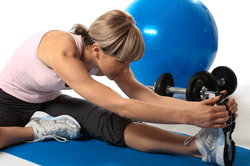 Many trainers will tell you to stretch before hitting a hard round of weight lifting or running. But recent research suggests that static stretching before a work out can actually hinder athletic performance.
Many trainers will tell you to stretch before hitting a hard round of weight lifting or running. But recent research suggests that static stretching before a work out can actually hinder athletic performance.
Two new studies add to the growing body of research on stretching and performance. In one study from The Journal of Strength and Condition Research, scientists discovered that people who stretched before lifting weights were weaker and less stable than people who used active warm-up techniques.
In the other new study, researchers conducted a meta-analysis of 104 studies that tested the effects of stretching on athletic performance. The studies compared the effects of different warm ups on jumping, sprinting, lifting weights, and dunking a basketball. After pooling the results, the researchers performed statistical calculations to estimate how much stretching actually affected muscle strength, power, and performance.
They found that static stretching decreased the strength of the stretched muscles by 5.5%, and the effect was worse for people who stretched for 90 seconds or more. Although the effects were less pronounced in people who stretched for under 45 seconds, the stretched muscles were still weakened.
The researchers also measured muscle power by analyzing how much force a muscle generated during contractions. Stretched muscles had a 2% decrease in power, and explosive muscular performance dropped by 2.8%. That means less explosive power for sprints, blocking a basketball shot, or making a fast tennis serve.
Scientists suspect that stretching impedes performance precisely because it does what we want it do— it loosens the muscles and tendons. "But in the process, it makes them less able to store energy and spring into action, like lax elastic waistbands in old shorts," explained Gretchen Reynolds, health reporter of The New York Times.
The new findings may be more applicable for people needing short bursts of energy rather than endurance sports however, since some studies show static stretching can help distance runners and cyclists.
Still, the researchers said it may be better to use active warm ups instead of static stretching to prepare the muscles without depleting their energy. Running in place, jumping jacks, or high-leg kicks are all good places to start. Beyond changing your warm up routine to prevent injuries, studies show that regular chiropractic care can reduce your risk of sports injuries.
References
Gergly JC. Acute effect of passive static stretching on lower-body strength in moderately trained men. Journal of Strength and Conditioning Research 2013;27(4):973-7. doi: 10.1519/JSC.0b013e318260b7ce.
Simic L, Sarabon N, and Markovic G. Does pre-exercise static stretching inhibit maximal muscular performance? A meta-analytical review. Scandinavian Journal Medical Science Sports. 2013 Mar;23(2):131-48. doi: 10.1111/j.1600-0838.2012.01444.x.